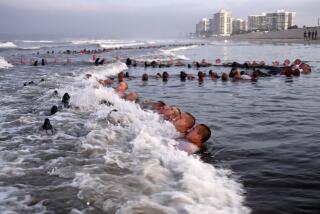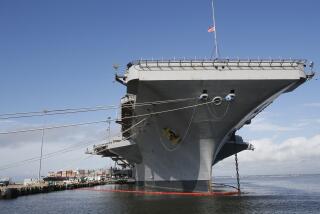Officers Judged Perot Too Immature for Naval Career : Politics: He was called ‘emotionally maladjusted’ after asking for early discharge, documents show.
- Share via
WASHINGTON — Some of the senior officers under whom Ross Perot served in the Navy judged him to be “emotionally maladjusted” and too immature to be a career naval officer after a 1955 incident in which he criticized the service and requested an early discharge, government documents show.
The assessments, contained in official letters to the chief of naval personnel commenting on Perot’s request, included one in which Capt. G. H. Miller--then commander of the destroyer division that included the ship on which Perot was serving--said Perot was “emotionally maladjusted for a regular Navy career.”
A second letter, sent to the secretary of the Navy and the chief of naval personnel by Rear Adm. J. C. Daniel, commander of destroyer forces in the Atlantic fleet, said the evidence he saw “indicates that (then-Lt. j.g.) Perot is too immature to be entrusted with the leadership responsibilities inherent in sea duty.” Daniel recommended that Perot be transferred to a “purely administrative” assignment ashore.
Perot, the Texas billionaire who is an undeclared independent presidential candidate, has come under criticism for attempting to obtain an early discharge from the Navy after serving only 15 months of the four years active duty that was required of recent Naval Academy graduates shortly after the Korean War.
Critics have suggested that Perot’s actions raise questions about his personality and character that may be important to assessing his fitness for the Oval Office.
At the same time, as is often true with Perot, qualities that some see as liabilities--in this case a tendency toward blunt outspokenness and unbending insistence on the correctness of his own values and opinions--are viewed by others as potential strengths for a President who must deal with the nation’s present problems.
Perot declined through a spokeswoman to comment on The Times report. However, Navy officials said Wednesday that he complained vigorously to the Navy after learning that the documents had been examined by The Times. Officials said the Naval Investigative Service has begun an investigation to learn how the documents were disclosed.
Interviews with many of Perot’s ex-shipmates, which formed the basis for an article published in The Times on June 4, suggested that Perot’s request for an early discharge stemmed in large part from disillusionment with his second commanding officer. That officer’s approach to command differed from that of the “textbook” captain whom the young Perot had admired during his first 15 months aboard the destroyer Sigourney.
At least one of Perot’s senior officers attributed his difficulties with the new captain to a personality clash.
At the same time, letters Perot wrote in connection with his effort to leave the Navy early made clear that he felt a broader dissatisfaction with the service as well. In his official letter requesting discharge, he said:
“I made the decision to become a career naval officer based upon the high standards of devotion to duty, honor, leadership, self-reliance, religion and other officerlike qualities that were taught at the Naval Academy. I have not found these high standards to exist generally in the fleet, and in some instances I have observed complete deviation from these standards.”
In a draft letter that he apparently later toned down, Perot wrote that he “found the Navy to be a fairly Godless organization” and that he did “not enjoy the prospect of . . . being subjected to drunken tales of moral emptiness, passing out penicillin pills and seeing promiscuity on the part of married men.” He also complained about widespread profanity.
Miller said in one of his letters that Perot had told him “that he hoped to be a social worker when he was released from the Navy, where he would have an opportunity to work with young people.”
Navy documents examined by The Times, including copies of the fitness reports filed by Perot’s superiors every six months as required by Navy regulations and their letters commenting on his application for an early discharge, suggest that such statements--and the outspokenly critical attitude they reflect--may have influenced senior officers to form their harsh judgments of him. So did his repeated clashes with his second commanding officer.
Fitness reports submitted by Perot’s first commanding officer on the Sigourney, Cmdr. Bernard A. Lienhard, describe him as an “outstanding” and exceptionally intelligent officer and recommended him for promotion from ensign to lieutenant (j.g.). Early reports were also positive from Lienhard’s successor, Cmdr. Gerald J. Scott, who took over command of the Sigourney in late 1954 when Lienhard went on to a new assignment.
But Scott’s reports on Perot’s performance also confirmed that the 24-year-old officer clashed sharply with his commander almost from the start, and that their relationship worsened markedly after April, 1955, when Perot requested his early discharge.
Although Perot did not specifically name Scott in outlining the reasons for his discharge, he apparently made no secret that he thought his captain was too lax and seemed to bend the rules too often.
Miller and Daniel, who were senior to both Scott and Perot, made their comments in late July, 1955, after being asked for their views by the chief of naval personnel, Vice Adm. James L. Holloway. Holloway later denied Perot’s request for an early discharge and ordered him transferred to the aircraft carrier Leyte, where Perot once again began receiving high marks for his performance.
Lienhard died several years ago, and The Times was unable to locate Miller and Daniel. Scott said Tuesday he could not remember details of the incidents involving Perot, but said he shared Miller’s and Daniel’s opinions of the case as expressed in the documents. In an interview for the June 4 story, however, Scott said he could hardly remember Perot “or any of the other junior officers on board.”
During Scott’s early days on the Sigourney, he described Perot in fitness reports as “a very excellent young naval officer” whose performance was “outstanding” and who clearly was recommended for promotion.
Only a few months later, however, after Perot requested an early discharge, Scott submitted fitness reports complaining that Perot’s performance had “not been up to previously reported” high standards. “He has on several occasions while conning the ship (directing the helmsman while the ship was under way) . . . placed it in an embarrassing position,” Scott wrote. “It is sincerely regretted that his personal views are in some conflict with the loyalty to the service demanded of commissioned officers.”
Scott also wrote in a letter--sent at the same time as Miller’s and Daniel’s to the chief of naval personnel--that Perot had repeatedly told him that he was “dissatisfied, personally unhappy and bitter with the requirements of present-day naval service.”
“To use his (Perot’s) phraseology, he cannot see why all the present efforts of labor, money and manpower continue ‘on this obsolete destroyer with out-of-date equipment to keep it ready for World War I” Scott said.
“I have had many private discussions with him in a sincere effort to broaden his views in this regard,” he added, “but the results were not successful.”
The newly examined documents also show that Perot was not aware of Miller’s and Daniel’s criticisms until about two months after he made his initial request for an early discharge. Asked to respond to Miller’s remarks, Perot wrote Holloway in July, 1955, that after being interviewed by Miller when he made the original request, “I was not advised that I had created any unfavorable impressions . . . or that any unfavorable official statement would be made against me as a result of the interview.”
In an effort to “disprove the charges” made by the senior officers, Perot asked the Navy to conduct a complete review of his Navy records, interrogate the officers and men with whom he served and grant him a “personal interview” with the secretary of the Navy or one of his civilian aides.
He also asked that if the facts showed him to be in the right, his record be cleared of any reference to the allegations.
In a memorandum dated May 18, 1956, the chief of naval personnel ordered that all correspondence related to Perot’s fitness reports for the period of March 1 to Aug. 31, 1955, be “removed,” and that it was “not to be made a part of his official record unless Perot should again submit his resignation prior to the year 1957.”
What was done about this directive is not known. But these are among the documents examined by The Times.
Scott, who retired from the Navy several years later as a commander, has been described by several of the Sigourney’s former crew members as less than a “textbook” officer. The commander has insisted in telephone interviews that he barely remembers Perot, and has denied allegations that Perot made in interviews a few months ago that the Sigourney’s skipper sought to use the crew’s recreation fund to redecorate his cabin.
At the time of the June 4 article, no one other than Perot could be found to comment on his allegations about Scott. Since then, however, Donald A. Phelps, who shared a stateroom with Perot when they were junior officers together on the Sigourney, has told The Times that both of Perot’s allegations were true.
Scott has denied all such charges.
More to Read
Get the L.A. Times Politics newsletter
Deeply reported insights into legislation, politics and policy from Sacramento, Washington and beyond. In your inbox twice per week.
You may occasionally receive promotional content from the Los Angeles Times.









